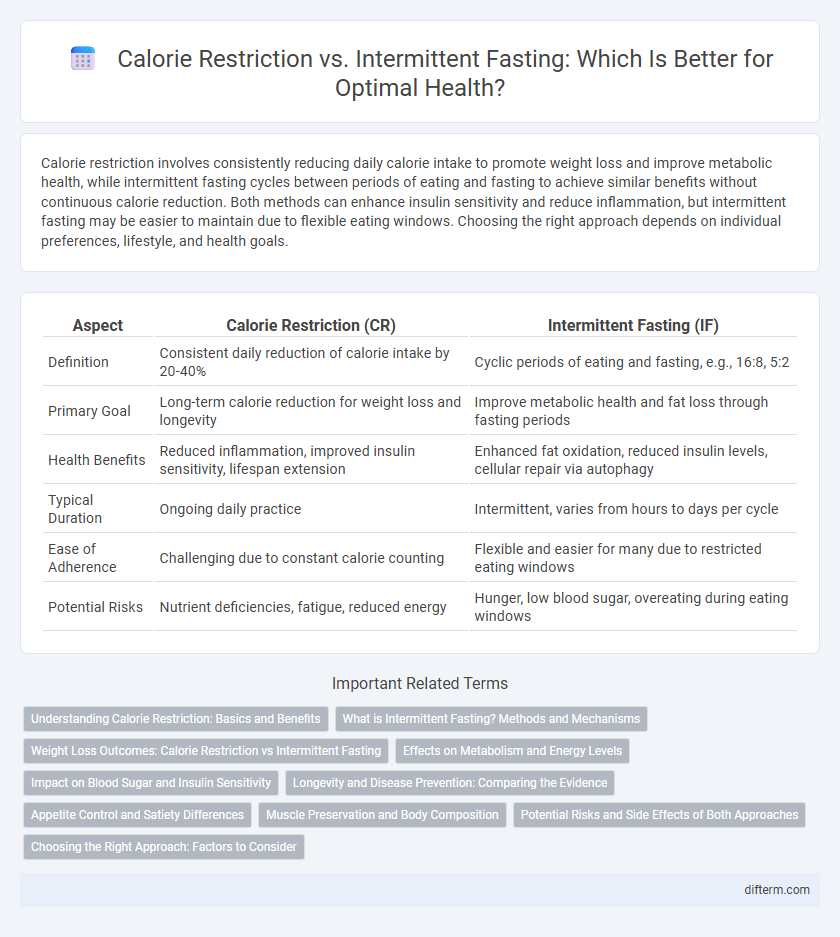Calorie restriction involves consistently reducing daily calorie intake to promote weight loss and improve metabolic health, while intermittent fasting cycles between periods of eating and fasting to achieve similar benefits without continuous calorie reduction. Both methods can enhance insulin sensitivity and reduce inflammation, but intermittent fasting may be easier to maintain due to flexible eating windows. Choosing the right approach depends on individual preferences, lifestyle, and health goals.
Table of Comparison
| Aspect | Calorie Restriction (CR) | Intermittent Fasting (IF) |
|---|---|---|
| Definition | Consistent daily reduction of calorie intake by 20-40% | Cyclic periods of eating and fasting, e.g., 16:8, 5:2 |
| Primary Goal | Long-term calorie reduction for weight loss and longevity | Improve metabolic health and fat loss through fasting periods |
| Health Benefits | Reduced inflammation, improved insulin sensitivity, lifespan extension | Enhanced fat oxidation, reduced insulin levels, cellular repair via autophagy |
| Typical Duration | Ongoing daily practice | Intermittent, varies from hours to days per cycle |
| Ease of Adherence | Challenging due to constant calorie counting | Flexible and easier for many due to restricted eating windows |
| Potential Risks | Nutrient deficiencies, fatigue, reduced energy | Hunger, low blood sugar, overeating during eating windows |
Understanding Calorie Restriction: Basics and Benefits
Calorie restriction involves consistently reducing daily caloric intake by 20-40% without malnutrition, promoting improved metabolic health and longevity. Studies demonstrate that calorie restriction enhances insulin sensitivity, reduces oxidative stress, and supports cardiovascular health. Key benefits include weight management, reduced inflammation, and decreased risk of chronic diseases such as type 2 diabetes and heart disease.
What is Intermittent Fasting? Methods and Mechanisms
Intermittent fasting is an eating pattern that cycles between periods of eating and fasting, promoting metabolic health by enhancing insulin sensitivity and activating cellular repair processes like autophagy. Popular methods include the 16/8 approach, which involves 16 hours of fasting and an 8-hour eating window, and the 5:2 method, where calorie intake is significantly reduced on two non-consecutive days per week. These fasting protocols influence hormonal balance, increase human growth hormone levels, and improve fat oxidation, contributing to weight management and chronic disease prevention.
Weight Loss Outcomes: Calorie Restriction vs Intermittent Fasting
Calorie restriction involves consistently reducing daily caloric intake, leading to steady and sustainable weight loss by creating a prolonged energy deficit. Intermittent fasting alternates periods of eating and fasting, often enhancing fat loss by improving metabolic flexibility and insulin sensitivity during fasting windows. Studies indicate both methods effectively reduce body weight, but intermittent fasting may offer additional benefits in preserving lean muscle mass and improving metabolic health markers.
Effects on Metabolism and Energy Levels
Calorie restriction consistently lowers basal metabolic rate by reducing overall energy intake, promoting fat oxidation while preserving lean muscle mass during weight loss. Intermittent fasting enhances metabolic flexibility by cycling between fasting and feeding states, boosting mitochondrial efficiency and increasing insulin sensitivity. Both approaches improve energy levels through optimized glucose regulation, but intermittent fasting may provide more sustained mental clarity and physical endurance during fasting periods.
Impact on Blood Sugar and Insulin Sensitivity
Calorie restriction consistently lowers blood sugar levels by reducing overall glucose intake, leading to improved insulin sensitivity and decreased risk of type 2 diabetes. Intermittent fasting enhances insulin sensitivity by promoting periods of low insulin release, which helps in stabilizing blood sugar and improving metabolic health. Both approaches contribute to better glycemic control, but intermittent fasting may offer more flexibility and rapid improvement in insulin response.
Longevity and Disease Prevention: Comparing the Evidence
Calorie restriction has been shown to extend lifespan and reduce the risk of chronic diseases such as cardiovascular disease and diabetes by lowering metabolic rate and oxidative damage. Intermittent fasting improves metabolic health markers like insulin sensitivity and inflammation, which are linked to reduced age-related diseases and enhanced longevity. Both approaches activate cellular stress response pathways, including autophagy and sirtuins, which contribute to improved healthspan and disease prevention.
Appetite Control and Satiety Differences
Calorie restriction typically involves a consistent daily reduction in caloric intake, leading to steady appetite suppression and enhanced satiety through stabilized blood glucose levels. Intermittent fasting promotes appetite control by cycling between periods of eating and fasting, triggering hormonal responses such as increased ghrelin and leptin sensitivity that regulate hunger signals. Studies indicate intermittent fasting may offer superior satiety regulation due to prolonged fasting intervals enhancing metabolic flexibility and reducing overall caloric intake.
Muscle Preservation and Body Composition
Calorie restriction and intermittent fasting both support fat loss while preserving muscle mass, but intermittent fasting often enhances body composition by promoting fat oxidation and maintaining muscle protein synthesis. Studies highlight that intermittent fasting may better preserve lean muscle during weight loss phases due to improved hormonal responses like increased growth hormone and insulin sensitivity. Maintaining muscle mass is crucial for metabolic health and optimizing body composition, making intermittent fasting a potent strategy in fitness and weight management protocols.
Potential Risks and Side Effects of Both Approaches
Calorie restriction may lead to nutrient deficiencies, fatigue, and impaired immune function if not properly managed, while intermittent fasting can cause dizziness, headaches, and irritability, especially during initial adaptation. Both approaches carry risks such as muscle loss and decreased metabolic rate if prolonged or excessively strict without medical supervision. Individuals with medical conditions or those who are pregnant should consult healthcare professionals before adopting either method.
Choosing the Right Approach: Factors to Consider
Calorie restriction and intermittent fasting differ in dietary structure and physiological impact, influencing factors such as metabolic health, lifestyle compatibility, and long-term adherence. Individuals with specific health conditions like diabetes or cardiovascular disease should consult healthcare professionals to determine the safest and most effective strategy. Personal preferences, activity levels, and sustainability are critical in selecting an approach that supports optimal weight management and overall well-being.
Calorie restriction vs Intermittent fasting Infographic

 difterm.com
difterm.com